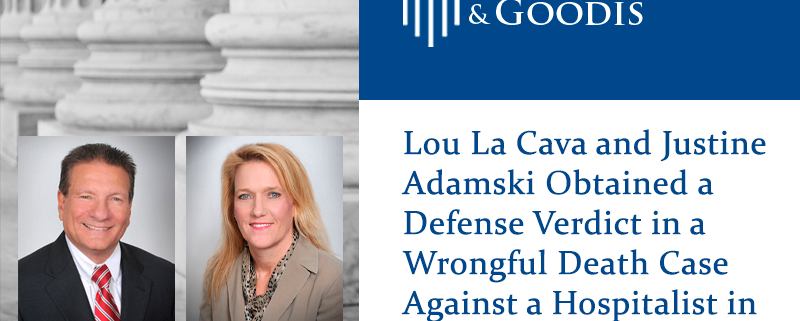Lou La Cava and Justine Adamski Obtained a Defense Verdict in a Wrongful Death Case Against a Hospitalist in Pinellas County Florida


Lou La Cava and Justine Adamski obtained a defense verdict in a two week medical malpractice wrongful death case tried in Pinellas County. The Plaintiff, who was 63 years old at the time, died within 26 hours after being discharged by the defendant hospitalist. He was survived by his wife and daughter. The patient came into the ER after having two episodes of shortness of breath and chest tightness the night before and the day of the visit. ER did an EKG which showed a left axis deviation and was called abnormal. A second EKG was normal. They worked him up as a cardiac patient. Troponins were normal. Chest x-ray was normal and D-Dimer was normal. ER physician’s assistant asked that the patient be admitted. The defendant admitted him for observation rather than as an in patient. The patient gave a history of asthma and took Advair for that. He had hypertension and diabetes. The defendant ordered an exercise and nuclear stress test to be performed the next morning. It was performed by a nuclear medicine physician. It was read as normal with the patient going about 7 minutes before needing the test stopped for fatigue and shortness of breath. The patient had two additional episodes of SOB in the hospital that appeared to be relieved by his asthma medicine. After the stress test the defendant discharged him but did not write a note and did not document a physical exam. He did not dictate his discharge summary until the next day after the patient had passed away. The patient was given a prescription for Albuterol to use as a rescue inhaler if he became SOB. The discharge diagnosis was reactive airway disease. It was recommended that he see his PCP in a week and have out patient pulmonary function tests done. He was told to do activities as tolerated. He went home and was apparently fine that day. He did not get the prescription for albuterol filled. The next day he was apparently fine in the morning but toward noon he began having either SOB or chest pain. He asked his wife to pick up the prescription. He went up to lie down and when the wife returned he had passed away. This was approximately 26 hours after he left the hospital. On autopsy he have left ventricular hypertrophy and moderate to severe COPD and emphysema. He apparently died from an arrythmia.
Plaintiff claimed he needed cardiac and pulmonary consults. Cardiologist would have ordered an echocardiogram which would have diagnosed LVH. A pulmonologist they claimed would have done pulmonary function studies which would have diagnosed his lung disease. If this was done plaintiff alleged he would have been put on alternative lung medication because the one he was on can increase the likelihood of an arrythmia. He would have also been given an oral steroid. A cardiologist would have adjusted his blood pressure meds to try to reverse his LVH. He would have been placed on bed rest and would have survived. Plaintiff had 4 expert witnesses testify. Plaintiff alleged his death was caused by another pulmonary SOB episode that led to the arrythmia.
The defense was that prospectively there was no need for the consultations. From a cardiac standpoint the work up was negative including an ejection fraction of 63. Even though he may have had LVH it was not causing left ventricular dysfunction. Therefore, the echocardiogram was not indicated. A pulmonologist was not needed because his pulmonary problem was not severe or continuous. It was episodic and responded to treatment. He did not need oral steroids for the same reason. The defense experts opined he died purely of a cardiac sudden death and there was nothing that could have been done in the hospital to prevent the death. PFTs can be done as an outpatient and even if done in the hospital would not have changed the treatment. The defense argued that when judged prospectively the care was well within the standard of care.
The jury deliberated approximately one hour and returned a verdict for the defense.



 litigation and appeals in all Florida state and federal courts.
litigation and appeals in all Florida state and federal courts.